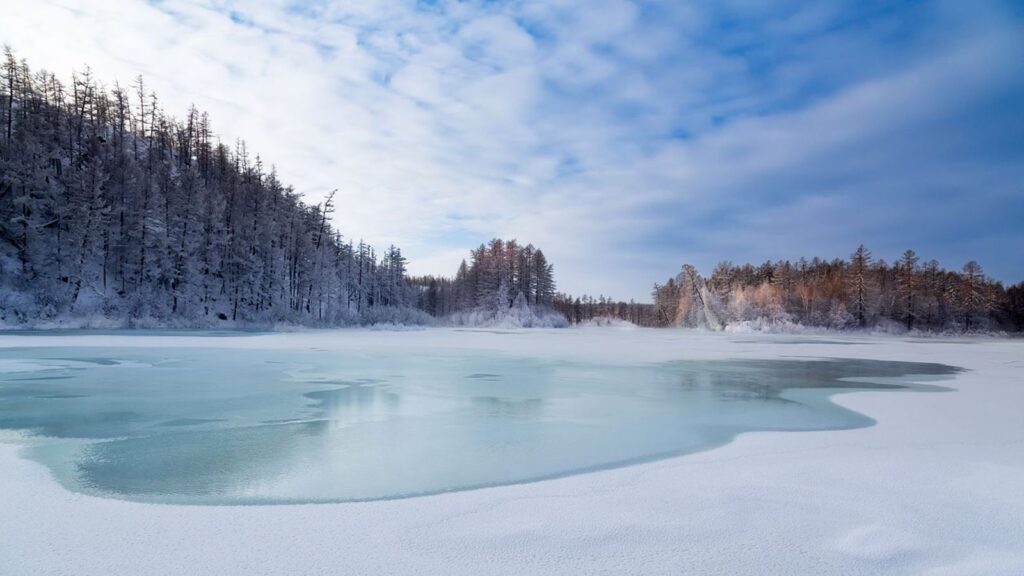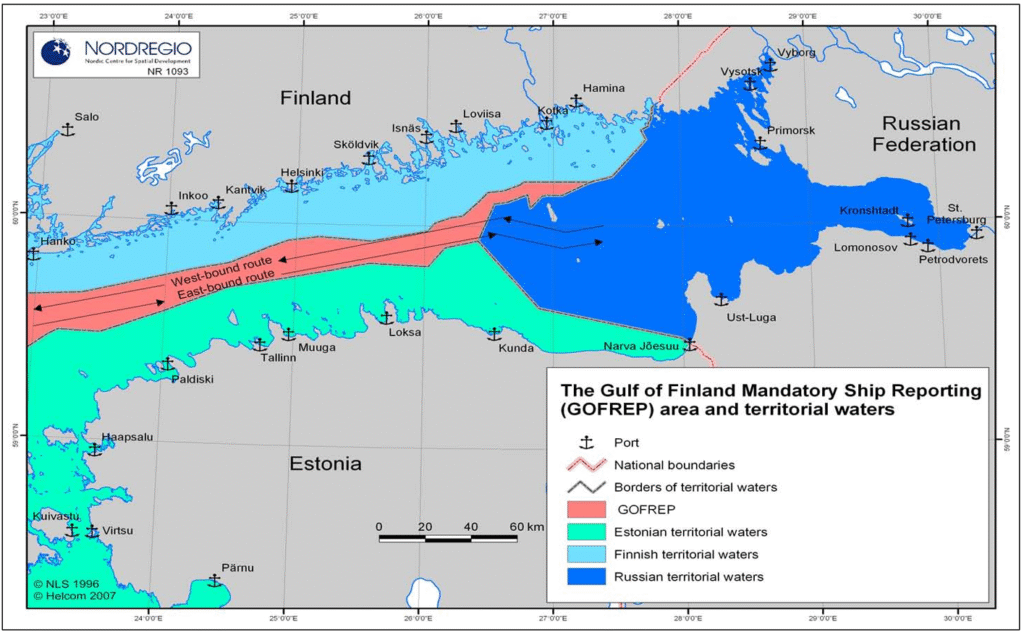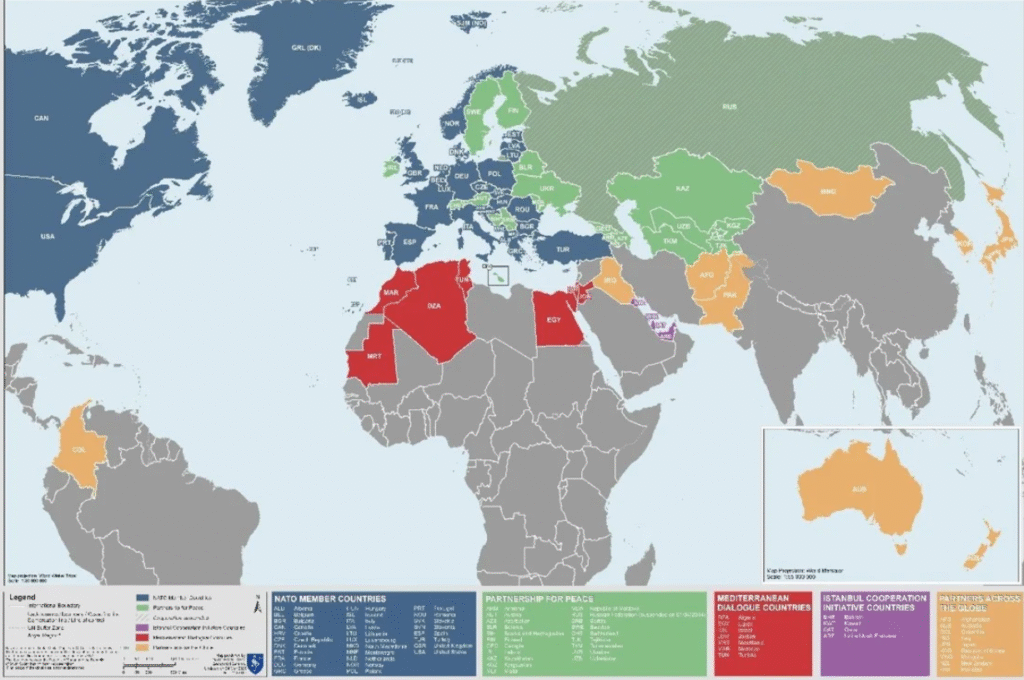

 Turquoise frazil on the Berkakit River in Yakutia (Sakha Republic), Siberia’s Arctic region. Home to Indigenous peoples, the area holds vast reserves of oil, gas, and rare earth minerals. Photo: Andrei Berezovskii.
Turquoise frazil on the Berkakit River in Yakutia (Sakha Republic), Siberia’s Arctic region. Home to Indigenous peoples, the area holds vast reserves of oil, gas, and rare earth minerals. Photo: Andrei Berezovskii.
This is part one of a five-part series written initially as a single essay under the title “Doublethink, Geopolitics, and Hegemony: The West’s Interest in Ukraine, Russia, and Russia’s Indigenous Peoples” by Joseph E. Fallon, a geopolitical analyst and contributor to the Fourth World Journal.
This section examines how the United States and its allies have employed contradictory logic—what Orwell dubs “doublethink”—to justify foreign policy decisions, particularly in relation to Ukraine. It traces how these contradictions have been framed as moral imperatives, even when they violate international law or historical truth. What’s considered legitimate, democratic, or even factual often shifts depending on whether it serves Western interests. Through this lens, we begin to see how ideas such as human rights and sovereignty are selectively applied in the pursuit of power.
In George Orwell’s novel 1984, the protagonist defines the concept of “doublethink” as:
To know and not to know, to be conscious of complete truthfulness while telling carefully constructed lies, to hold simultaneously two opinions which cancelled out, knowing them to be contradictory and believing in both of them, to use logic against logic, to repudiate morality while laying claim to it…to forget whatever it was necessary to forget, then to draw it back into memory again at the moment when it was needed, and then promptly to forget it again, and above all, to apply the same process to the process itself—that was the ultimate subtlety: consciously to induce unconsciousness, and then, once again, to become unconscious of the act of hypnosis you had just performed. Even to understand the word—doublethink—involved the use of doublethink.1
“Doublethink” defines U.S. foreign policy, promoted by American theorists, strategists, and pundits as Geopolitics. Paradoxical positions become dogmas. “Two and two made five, and you would have to believe it.” The United States fights ISIS in Iraq. They are terrorists. The United States supports ISIS in Syria.2 They are freedom fighters. When Russia moved troops into Crimea in 2014, “U.S. Secretary of State John Kerry made the rounds of the major political talk shows. He stated, ‘You don’t just invade another country on a phony pretext in order to assert your own interests.’ The Orwellian doublethink required to make such a statement is palpable. The United States has invaded or, as the political Thought Police would say, ‘intervened,’ all over the world countless times, each time violating those principles of sovereignty and territorial integrity that Kerry and the Obama administration seem to hold so dear today.”3
The appropriateness of an action undertaken by a state or non-state actor, the authenticity of a nation, the legitimacy of a state, the validity of an international border, and the fairness of an election—each is decided by whether it provides an economic or strategic benefit to NATO, the EU, and the United States. Through “doublethink,” NATO, EU, and the United States view such acts of self-interest as, and believe them to be, the promotion of human rights. Therefore, secession by pro-West Kosovo is “good.” Secession by pro-Russia Abkhazia is “bad.” An independence vote in Croatia is “good.” An independence vote in Catalonia is “bad.” Syria’s dictator, Assad, is Putin’s “puppet.” Azerbaijani dictator Aliyev is the EU’s “partner.”
Disagreeable histories, such as the Ukrainian nationalists’ alliance with Nazi Germany or their massacres of Jews and Poles,4 are conveniently forgotten, as are more recent events. In his 2019 article for The Nation, titled “Neo-Nazis and the Far Right Are On the March in Ukraine,” Lev Golinkin reported:
There are neo-Nazi pogroms against the Roma, rampant attacks on feminists and LGBT groups, book bans, and state-sponsored glorification of Nazi collaborators. These stories of Ukraine’s dark nationalism aren’t coming out of Moscow; they’re being filed by Western media, including US-funded Radio Free Europe (RFE); Jewish organizations such as the World Jewish Congress and the Simon Wiesenthal Center; and watchdogs like Amnesty International, Human Rights Watch, and Freedom House…5
But since such acts are only committed by “enemies,” not allies, and since Ukraine is an ally seeking membership in NATO, “doublethink” requires such facts to be dropped down “the memory hole.” As Orwell wrote, “The past was alterable.”
“Doublethink,” geopolitics, and hegemony came together in a “perfect storm” when Russia invaded Ukraine on February 24, 2022. The invasion was a continuation of four historical episodes, 1846-1914, 1917-1921, 1940-1945, and 1991-2025, in which outside powers promoted Ukrainian nationalism to weaken the Russian state.
To achieve both goals, the West now seeks to utilize the Indigenous nations of Russia as political pawns. Indigenous nations are the most numerous “pieces” on the geopolitical “chessboard” of Eurasia, but also the weakest. The West will sacrifice them, their lands, and their cultures just to gain a strategic, tactical, or economic advantage over Russia, let alone hegemony over the Arctic Circle. For the West, Russia’s indigenous nations are the political equivalent of “cannon fodder.”
The period from 1991 to 2025, encompassing the end of the Cold War, the fall of the Soviet Union, and the emergence of the United States as a hyperpower, has marked a radical reorientation in the interest of the West in Ukrainian nationalism and how it could best be exploited.
Interest shifted from first supporting the secession of the 14 non-Russian union republics from the Soviet Union to then expanding NATO eastward to the borders of Russia.
NATO has placed St. Petersburg, Russia’s second-largest city, in a double envelopment. Finland is 250 miles north of the city. Estonia is 195 miles south of it. Tanks can travel at about 25 miles per hour on flat terrain and up to 45 miles per hour on roads! Some tanks have even gone as fast as 60 to 70 miles per hour for short periods of time.” Tanks based at the Finnish border can reach St. Petersburg in ten, possibly six hours. Tanks at the Estonian border can reach the city in eight, possibly five hours. NATO is positioned to be able to invade or blockade the city. (Map 1)
Map 16
Double envelopment of St. Petersburg: 2025

Map 27
Siege of Leningrad, 1941

“…in 2020, NATO conducted a live-fire training exercise inside Estonia. The exercise took place 70 miles from Russia’s border, using tactical missiles with ranges up to 185 miles. These weapons can strike Russian territory with minimal warning. In 2021, again in Estonia, NATO fired 24 rockets to simulate an attack on air defense targets inside Russia.”8
There has now been another shift to exploit the Russian-Ukrainian war to fragment Russia into a multiplicity of Western client states. Such a “balkanization” would enable the West to secure hegemony over the energy and natural resources of Russia. Russia, the world’s largest country, possesses the world’s largest reserves of natural resources, including oil, natural gas, coal, timber, gold, and rare earth metals, valued at $75 trillion.9
Control of Russia means control of the Arctic Ocean, which holds an estimated 13% of the world’s unexploited oil, 30% of the world’s untapped natural gas, and a rich reserve of copper, cobalt, and, most importantly, rare earth metals.10 (Map 3)
Map 311
“Arctic Oil and Gas: The Role of Regions”

In “Going Critical,” the U.S. Geological Survey wrote,
Rare-earth elements (REE) are necessary components of more than 200 products across a wide range of applications, especially high-tech consumer products, such as cellular telephones, computer hard drives, electric and hybrid vehicles, and flat-screen monitors and televisions. Significant defense applications include electronic displays, guidance systems, lasers, and radar and sonar systems. Although the amount of REE used in a product may not be a significant part of that product by weight, value, or volume, the REE can be necessary for the device to function. For example, magnets made of REE often represent only a small fraction of the total weight, but without them, the spindle motors and voice coils of desktops and laptops would not be possible.12
Currently, China processes 90% of the world’s rare earth metals.13 Beijing is in a position to squeeze Western economies by limiting their supply of these metals. But with control of the rare earth metals in Russia and the Arctic Ocean, the West breaks Beijing’s monopoly
Such control also allows NATO to establish hegemony over the land, air, and sea corridors of the Northern Hemisphere. The Northern Hemisphere is NATO; NATO is the Northern Hemisphere. (Map 4)
Map 414
Transportation corridors encircling the Northern Hemisphere

Together with allies and partners in Eurasia: Japan, South Korea, Australia, and New Zealand, the former, Kazakhstan, Kyrgyzstan, Mongolia, Tajikistan, Turkmenistan, and Uzbekistan, the latter, and a friendly India, NATO could destabilize Beijing by forcing it to overextend itself, militarily and financially, in order to maintain its strategic global position. (Map 5)
Map 515
NATO Member and Partner Countries

It is an adaptation of Halford John Mackinder’s geopolitical theory of the “Heartland.” According to his theory, Russia is the heart of the “Heartland.” In 1919, Mackinder wrote in Democratic Ideals and Reality: A Study in the Politics of Reconstruction:
Taken together, the regions of Arctic and Continental drainage measure nearly a half of Asia and a quarter of Europe, and form a great continuous patch in the north and centre of the continent. That whole patch, extending right across from the icy, flat shore of Siberia to the torrid, steep coasts of Baluchistan and Persia…Let us call this great region the ‘Heartland of the Continent.16 (Map 6)
Map 617
Evolution of Mackinder’s “Heartland”

Halford summarized his theory on geography and hegemony in three famous lines. “Who rules East Europe [NATO] commands the Heartland [Russia]; Who rules the Heartland [Russia] commands the World Island [Eurasia]; Who rules the World Island [Eurasia] commands the World.”18
Control of Ukraine is the prerequisite for commanding the Heartland. To that end, foreign powers have manipulated Ukrainian nationalism for nearly 200 years.
1 George Orwell, 1984, Part 1, Chapter 3, https://www.george-orwell.org/1984/2.html
2 Dana E. Abizaid, “Our George Orwell/Noam Chomsky paradox: Let’s decipher the doublethink media and government peddles about U.S. foreign policy,” Salon, January 2, 2016, https://www.salon.com/2016/01/02/our_george_orwellnoam_chomsky_paradox_lets_decipher_the_doublethink_media_and_government_peddles_about_u_s_foreign_policy
3 Eric Draitser, “Ukraine, Intervention, and America’s Doublethink,” Counterpunch, March 3, 2014, https://www.counterpunch.org/2014/03/03/ukraine-intervention-and-americas-doublethink/
4 Ido Vock, “Ukraine’s problematic nationalist heroes,” The New Stateman, January 5, 2023, Ukraine’s problematic nationalist heroes – New Statesman
5 Lev Golinkin, “Neo-Nazis and the Far Right Are On the March in Ukraine,” The Nation, February 22, 2019, https://www.thenation.com/article/politics/neo-nazis-far-right-ukraine/
6 Christer Pursiainen (ed.) assisted by Per Francke, “Early Warning and Civil Protection When does it work and why does it fail?,” Emilio Cocco, “Maritime Safety in the North Adriatic Sea and the Gulf of Finland,” January 2008, Nordregio Report 2008:1, Stockholm, Sweden, p. 151 early_warning_civpro_maritime_safety (2).pdf
7 Martin Gilbert, Atlas of Russian History, Dorset Press, 1985, p. 118, Atlas of Russian History : Martin Gilbert : Free Download, Borrow, and Streaming : Internet Archive
8 Benjamin Abelow, How the West Brought War to Ukraine: Understanding How U.S. and NATO Policies Led to Crisis, War, and the Risk of Nuclear Catastrophe, Siland Press, Great Barrington, Massachusetts, 2022, p. 26.
9 Bruno Venditti, “Ranked: Top 10 Countries by Value of All Their Natural Resources,” Visual Capitalist, November 7, 2024, https://www.visualcapitalist.com/ranked-top-10-countries-by-value-of-all-their-natural-resources/#google_vignette
10 Yannis Bassias, “Arctic partnerships and energy upheavals,” Modern Diplomacy, March 4, 2025, https://moderndiplomacy.eu/2025/03/04/arctic-partnerships-and-energy-upheavals/
11 Andreas Østhagen, “Arctic Oil and Gas: The Role of Regions,” The Arctic Institute, October 24, 2013, https://www.thearcticinstitute.org/arctic-oil-and-gas-role-regions/
12 U.S. Geological Survey, “What are rare earth elements, and why are they important?,” American Geosciences Institute, https://profession.americangeosciences.org/society/intersections/faq/what-are-rare-earth-elements-and-why-are-they-important
13 Lewis Jackson, Amy Lv, Eric Onstad and Ernest Scheyder, “China hits back at US tariffs with export controls on key rare earths,” Reuters, Apil 4, 2025, https://www.reuters.com/world/china-hits-back-us-tariffs-with-rare-earth-export-controls-2025-04-04
14 Theo Notteboom and Jean-Paul Rodrigue, “Containerisation, Box Logistics and Global Supply Chains: The Integration of Ports and Liner Shipping Networks,” International Journal of Maritime Economics, March 2008, 10(1-2):152-174 (PDF) Containerisation, Box Logistics and Global Supply Chains: The Integration of Ports and Liner Shipping Networks
15 “Agency experts deliver critical network to NATO Partners,” NATO, October 31, 2022, https://www.ncia.nato.int/about-us/newsroom/agency-experts-deliver-critical-network-to-nato-partners
16 Halford John Mackinder, Democratic Ideals and Reality, London, Constable & Company, 1919, p. 96 https://archive.org/details/democraticideals00mackiala/page/194/mode/2up
17 Muhammad Nadeem Mirza, “Heartland, Rimland, and the Grand Chessboard Deciphering the Great Power Politics in Central Asia,” University of Wah Journal of Social Sciences 5(1), June 2022, p.192, https://www.researchgate.net/publication/367691440_Heartland_Rimland_and_the_Grand_Chessboard_Deciphering_the_Great_Power_Politics_in_Central_Asia
18 Halford John Mackinder, Democratic Ideals and Reality, London, Constable & Company, 1919, p. 194 https://archive.org/details/democraticideals00mackiala/page/194/mode/2up
The library is dedicated to the memory of Secwepemc Chief George Manuel (1921-1989), to the nations of the Fourth World and to the elders and generations to come.
access here